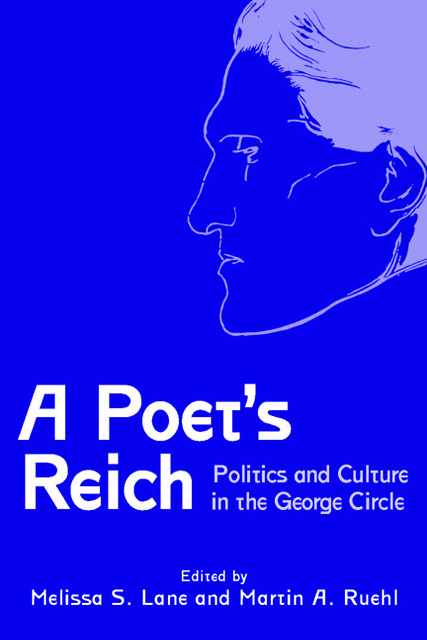7 - The Platonic Politics of the George Circle: A Reconsideration
Published online by Cambridge University Press: 10 February 2023
Summary
Introduction
That Plato Became A Passionate Concern of Stefan George and his Circle is not in doubt. Some twenty-six books about Plato were published by members of the Circle, culminating in Platon: Der Kampf des Geistes um die Macht (1933) by the medical doctor and philosopher Kurt Hildebrandt. Yet even before Hildebrandt’s book was published, external discussion of Plato’s importance for the Circle had already begun with Franz Josef Brecht’s 1929 Platon und der George-Kreis. It is well known that Friedrich Wolters’s reference to the Circle as a “staat” was a deliberate invocation of Plato’s Republic. In particular, as Peter Hoffmann observes, it recalls the passage in Book 9, in which Socrates avers to Glaucon that it does not matter whether the state (strictly, regime or politeia) they have been founding in speech ever comes into being on earth, or whether it exists only in heaven as a model (paradeigma): it is the true country of the philosopher, and the only city that he will serve. This implicit invocation of Plato underscores the evident contribution of a Platonic notion of politics to the Circle’s developing conception of its own political role. Peter Hoffmann sums up the roles of Berthold von Stauffenberg and, eventually, Claus von Stauffenberg as George’s executors thus: “They were the appointed heirs of the Master’s Platonic ‘state,’ committed to the realization of the Secret Germany.”
Recent scholars have increasingly highlighted the significance of Plato for the Circle: Thomas Karlauf classes Plato second only to Hölderlin in his impact on the Circle’s thought between 1910 and 1914, stressing the pedagogic eros and esoteric method drawn from him, and Teresa Orozco has situated the George Circle’s appropriation of Plato in the context of a broader “Selbstfaschistisierung” of ancient philosophy and classics in German culture, tracing the commonalities between Kurt Hildebrandt’s reading, in particular, and other explicitly Nazi uses of Plato. Nevertheless, the precise articulation of firstly, what the Circle’s conception of its political role was, and secondly, the nature and significance of the Platonic contribution to it, have been matters of scholarly contention. I argue that light can be shed on these two points by linking them together.
- Type
- Chapter
- Information
- A Poet's ReichPolitics and Culture in the George Circle, pp. 133 - 163Publisher: Boydell & BrewerPrint publication year: 2011
- 2
- Cited by

